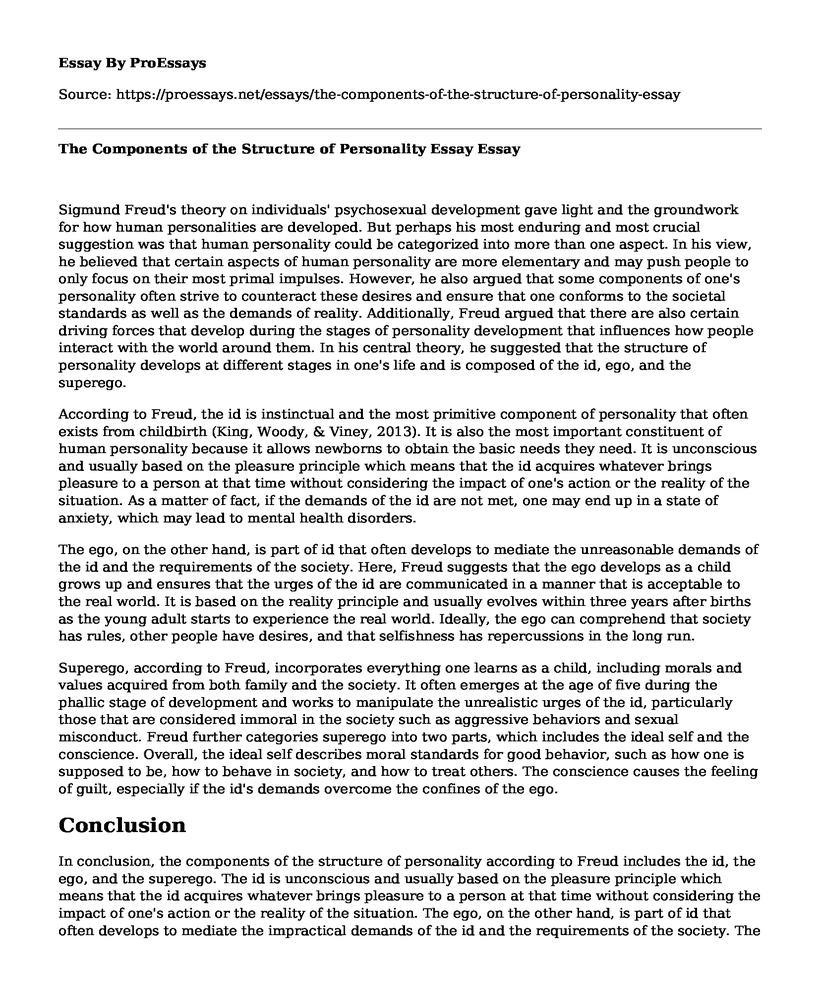Sigmund Freud's theory on individuals' psychosexual development gave light and the groundwork for how human personalities are developed. But perhaps his most enduring and most crucial suggestion was that human personality could be categorized into more than one aspect. In his view, he believed that certain aspects of human personality are more elementary and may push people to only focus on their most primal impulses. However, he also argued that some components of one's personality often strive to counteract these desires and ensure that one conforms to the societal standards as well as the demands of reality. Additionally, Freud argued that there are also certain driving forces that develop during the stages of personality development that influences how people interact with the world around them. In his central theory, he suggested that the structure of personality develops at different stages in one's life and is composed of the id, ego, and the superego.
According to Freud, the id is instinctual and the most primitive component of personality that often exists from childbirth (King, Woody, & Viney, 2013). It is also the most important constituent of human personality because it allows newborns to obtain the basic needs they need. It is unconscious and usually based on the pleasure principle which means that the id acquires whatever brings pleasure to a person at that time without considering the impact of one's action or the reality of the situation. As a matter of fact, if the demands of the id are not met, one may end up in a state of anxiety, which may lead to mental health disorders.
The ego, on the other hand, is part of id that often develops to mediate the unreasonable demands of the id and the requirements of the society. Here, Freud suggests that the ego develops as a child grows up and ensures that the urges of the id are communicated in a manner that is acceptable to the real world. It is based on the reality principle and usually evolves within three years after births as the young adult starts to experience the real world. Ideally, the ego can comprehend that society has rules, other people have desires, and that selfishness has repercussions in the long run.
Superego, according to Freud, incorporates everything one learns as a child, including morals and values acquired from both family and the society. It often emerges at the age of five during the phallic stage of development and works to manipulate the unrealistic urges of the id, particularly those that are considered immoral in the society such as aggressive behaviors and sexual misconduct. Freud further categories superego into two parts, which includes the ideal self and the conscience. Overall, the ideal self describes moral standards for good behavior, such as how one is supposed to be, how to behave in society, and how to treat others. The conscience causes the feeling of guilt, especially if the id's demands overcome the confines of the ego.Conclusion
In conclusion, the components of the structure of personality according to Freud includes the id, the ego, and the superego. The id is unconscious and usually based on the pleasure principle which means that the id acquires whatever brings pleasure to a person at that time without considering the impact of one's action or the reality of the situation. The ego, on the other hand, is part of id that often develops to mediate the impractical demands of the id and the requirements of the society. The superego, however, incorporates everything one learns as a child, including morals and values acquired from both parents and society.
Reference
King, D. B., Woody, W. D., & Viney, W. (2013). History of Psychology: Ideas and Context. (5th Ed.). Routledge.
Cite this page
The Components of the Structure of Personality Essay. (2022, Feb 28). Retrieved from https://proessays.net/essays/the-components-of-the-structure-of-personality-essay
If you are the original author of this essay and no longer wish to have it published on the ProEssays website, please click below to request its removal:
- Definition of Meaningfulness, Happiness, and Morality Using Todd May Ideas
- Stress Management Annotated Bibliography
- The Concept of Mental Health Essay Example
- Essay Sample on Success in College
- Essay on Personality Psychology: Examining Individual Differences in Personality
- Essay Sample on Moods vs. Emotions: Exploring the Connections & Differences
- Essay on How Walt Disney Ruined Our Love Lives: The Impact on Modern Romantic Relationships







